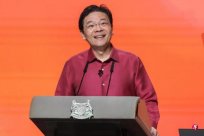Even inadvertently, the streets of China are very different compared to just a few years ago.
Most people can not only glance at these changes -once the road of fuel vehicles and foreign brand cars, and now it has become the home of Chinese brand electric vehicles with fashionable appearance.
This may be the most obvious in the transformation of Japanese brand cars.They occupied one -third of the Chinese market share during its heyday, but now only less than two of each of each of their ten cars are Japanese brands.
As one of this symbol of this huge change, the Japanese metal industry giant, the Japanese Railway Corporation announced that it has ended the joint venture with China Baoshan Iron and Steel Company for 20 years, and the reason for sales is the decline in sales performance.
The official termination of this joint venture marks the end of the cooperation relationship between the two parties in the past 50 years.The breakup of the two companies reflects the huge leap in China's manufacturing industry since the beginning of the cooperation between the two countries.
In October 1978, Deng Xiaoping conducted a historic visit to Japan.This is the first opportunity to observe and experience Japanese technology and management practice.
One of the most important itinements in this visit is to visit the Japanese Iron and Steel Factory, which are reflected in the reports and documentary on the two countries.This laid the tone for China's economic transformation, because steel was regarded as the cornerstone industry at that time, especially in the manufacturing industry.
It is worth noting that Deng Xiaoping's visit to the Japanese Railway Corporation's Junjin Factory inspired his ambition to copy Japanese companies, thus paving the way for the birth of Baosteel, and laid the foundation for the relationship between the two countries.
Deng Xiaoping quickly turned ambitions into action.The Third Plenary Session of the Eleventh Central Committee of the Communist Party of China held in December of the same year became the springboard for economic reform.
In a series of measures aimed at opening up China's vast markets, a large steel production complex was completed and eventually became Baosteel.
Today, the Chinese Baowu Iron and Steel Group, which is merged from Baosteel and Wuhan Iron and Steel, has become the world's largest steel producer, while China is the world's largest steel producer and consumer country.
Zhao Zhijiang (Yin), a researcher at Beijing Anbang Consulting Company, said that the breakup of Japanese iron -making companies with Chinese companies indicates that Sino -Japanese economic relations have changed from previous teachers and students to more equal and even competitive relations.
He said: "In the past, Japanese companies entered the Chinese market to obtain profits, while China was to learn new technologies and improve production capacity."
"Chinese car manufacturers are now very powerful and have the ability to iterate innovation. On the other hand, Japanese auto manufacturers have a slow response to the growth of the electric vehicle market, resulting in poor performance in the Chinese market. Facing many competitors,Their exit can be regarded as a natural elimination process. "Zhao Zhijiang said.
He said that China has surpassed Japan in the fields of trade and automobile exports, and China has transformed from a "world factory" to a "world market".This makes it difficult for the status quo of Sino -Japanese economic relations to compare with the past, as the role of the two countries has changed.
In the first half of this year, the three major Japanese automobile manufacturers — Toyota, Nissan and Honda -total sales in China were only 1.54 million units, a decrease of 13%from the same period last year, and the third year of sales declined.
At the same time, data from the China Automobile Industry Association shows that domestic car brands have increased slightly year -on -year, and Chinese brand models account for more than 60%of the market share.
Compared with Chinese competitors, Japanese auto manufacturers have slowly transformed into electric vehicles.Some Japanese companies seem to have completely abandoned this field -Mitsubishi Motor left China in 2023, and Nissan also closed several Chinese factories.
Guo Hai, a researcher at the Public Policy Research Institute of South China University of Science and Technology, said that, in view of the current intense geopolitical relationships between China and the United States, it is difficult to foresee that China and Japan will have more cooperation in the high -tech field.
Although the Japanese rail -making company is about to break up with Chinese companies, the company will continue to carry out business in China.
As China's economic influence is getting bigger and bigger worldwide, China has changed its views on overseas business -no longer satisfied with only attracting foreign investment, but looking for investment opportunities overseas.
The head of a think tank studying and reform in Guangdong Province said that in the past 40 years, China has become a rising force in the steel and automobile industries, which are indicators of the level of industrialization.
He said that in the face of the suppression of Western countries, "going out" has become an inevitable choice for Chinese companies.As the anti -globalization mood rose, the expansion of China's manufacturing industry supported the continued advancement of globalization.
This article was published by the Hong Kong South China Morning Post website on August 21. The original title was how the close cooperation between Sino -Japanese Iron and Steel was eventually eroded. The author was Luna Sun.




